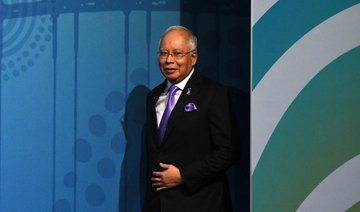KUALA LUMPUR: The Malaysian government Monday proposed a “fake news” law which would carry a maximum 10-year jail term, including for articles published abroad, sparking fears of a crackdown on dissent as elections loom.
Governments in several countries, emboldened by US President Donald Trump’s fulminations against “fake news,” are considering such legislation. But rights groups warn that authoritarian regimes are likely to use such laws to silence opposing voices.
Malaysian Prime Minister Najib Razak has already been targeting critics in politics and the media who have attacked him over allegations that huge sums were looted from sovereign wealth fund 1MDB. Najib and the fund deny any wrongdoing.
The proposed law, introduced in parliament Monday, fueled fears the government is seeking to intensify a clampdown before a general election, which must be called by August but is widely expected sooner.
Opposition MP Charles Santiago said the bill was “a powerful weapon for the government to silence dissent in the country.”
“It is timed for the elections and to silence discussions on 1MDB,” he told AFP.
The bill, which described fake news as a “global concern,” includes a maximum 10 years in jail or fine of up to 500,000 ringgit ($130,000) for anyone guilty of creating or disseminating what authorities deem to be fake news.
It said anyone — including foreigners — who breaks the law outside the country by publishing fake news can face punishment in Malaysia, as long as what is published concerns Malaysia or a Malaysian citizen.
Fahmi Fadzil, spokesman for the opposition People’s Justice Party, said it suggested the government was seeking to target foreign media, which have led the coverage of 1MDB.
Phil Robertson, Asia deputy director for Human Rights Watch, accused the Malaysian government of employing “Trump-style scare tactics to grant itself powers to arbitrarily determine what people can say about Malaysia in the world.”
Amnesty International said the bill was “nothing but a blatant attempt to shield the government from peaceful criticism.”
It was no coincidence that it had been tabled with general elections just around the corner, said Amnesty’s regional director James Gomez in a statement.
Malaysia’s traditional pro-government media have reported on the 1MDB controversy only occasionally and in a muted and largely uncritical fashion.
Despite the concerns, cabinet minister Wan Junaidi Tuanku Jaafar insisted the law “will not be abused,” adding: “It is not aimed at silencing critics.”
The bill must be approved by a majority in the 222-seat lower house and also in the upper house, and this is likely as both chambers are controlled by the ruling coalition. It needs to go through several readings in parliament before it passes.
Malaysia is ranked 144th out of 180 countries in Reporters Without Borders’ World Press Freedom Index.
The government has the power to revoke newspapers’ printing permits and regularly attacks critical media, particularly online news sites that have gained a following by reporting on official malfeasance and corruption.
Other countries in Southeast Asia have also been taking aim at what they claim is fake news.
Philippine lawmakers are mulling an anti-fake news bill introduced last year by a supporter of President Rodrigo Duterte, who has done battle with media outlets critical of his deadly drug war.
The proposed legislation reserves its harshest penalties, up to $382,500 and imprisonment of up to 20 years, for mass media organizations that refuse to take down fake news items.
In tightly-controlled Singapore, a parliamentary committee has been holding hearings this month as it examines potential measures to combat false online information, including legislation.
Malaysia proposes 10 years’ jail for ‘fake news’
Malaysia proposes 10 years’ jail for ‘fake news’

CNN rules for first US presidential debate: no props, muted microphones

- CNN said candidates eligible to participate must appear on a sufficient number of state ballots to reach the 270 electoral vote threshold needed to win and receive at least 15 percent in four separate national polls
WASHINGTON: The first US presidential debate between incumbent Joe Biden and Republican rival Donald Trump on June 27 will include two commercial breaks, no props and muted microphones except when recognized to speak, CNN said Saturday. In May, the candidates agreed to face off in two debates including one this month that will be moderated by CNN anchors Jake Tapper and Dana Bash in Atlanta, while the other on Sept. 10 will be hosted by ABC.
CNN said Saturday both candidates will appear at a uniform podium during the 90-minute debate, podium positions will be determined by a coin flip and candidates will be given a pen, a pad of paper and a bottle of water but cannot use props.
“Microphones will be muted throughout the debate except for the candidate whose turn it is to speak,” CNN said.
CNN, a division of Warner Bros Discovery, said the moderators “will use all tools at their disposal to enforce timing and ensure a civilized discussion.”
During the two commercial breaks, campaign staff may not interact with their candidate, and there will be no studio audience.
CNN said candidates eligible to participate must appear on a sufficient number of state ballots to reach the 270 electoral vote threshold needed to win and receive at least 15 percent in four separate national polls. CNN said it is “not impossible” Robert F. Kennedy Jr., who is running as an independent, could qualify, saying he has received at least 15 percent in three qualifying polls to date and has qualified for the ballot in six states, making him eligible for 89 electoral college votes.
Debates, which will draw a US live television audience in the tens of millions, are fraught with risks for both candidates, who face a close race. Biden has three preferred debate topics, according to a campaign memo viewed by Reuters: abortion rights, the state of democracy and the economy.
Trump refused to debate his rivals during the Republican nominating race. His team has pointed to immigration, public safety and inflation as key issues ahead of the debate.
Indonesia minister threatens to shut down X over adult content

- X has recently updated its policies to permit consensually produced adult content
- Minister Budi Arie Setiadi said it had sent a letter to X to demand revision of policy
JAKARTA: Indonesia is prepared to shut down social media platform X if it does not comply with a regulation barring adult content, the country’s communications minister said on Friday.
Indonesia, the world’s biggest Muslim-majority country, has strict rules that ban the sharing online of content deemed obscene.
Minister Budi Arie Setiadi told Reuters he had sent a warning letter to X related to this matter.
“We will certainly shut its services down,” he said, pointing to Indonesia’s electronic information and transaction (ITE) law that can carry a six-year jail sentence if someone spreads pornographic content.
His comments in an interview come after the social media platform recently updated its policies to permit consensually produced adult content.
X, owned by billionaire Elon Musk, has not responded to Indonesia’s warning letter, Budi said, adding the government would send more letters before deciding on a potential closure.
X, formerly known as Twitter, did not immediately respond to a request by Reuters for comment.
Indonesians are big users of social media and X has 24.85 million users in the country, according to data gathering business Statista.
New ‘Million Dollar Island’ seasons to be produced at NEOM

- Talpa Studios recommissions hit reality show for MBC in the Middle East, NET5 in the Netherlands
DUBAI: Talpa Studios, which was founded by John de Mol, the creator of popular shows “The Voice” and “Big Brother,” has recommissioned its reality show “Million Dollar Island” for new seasons in the Middle East and the Netherlands.
The new seasons — titled “Million Dollar Land” or “Ard Al-Million” for MBC in the Middle East and “Million Dollar Desert” for NET5 in the Netherlands — will be produced at Saudi Arabia’s NEOM production hub, in collaboration with regional production house Blue Engine Studios.
This will be the second season of “Ard Al-Million.” The first season aired on MBC Group’s TV channels MBC1, MBC IRAQ, and Shahid last May.
Produced by Monday Media, “Million Dollar Island” also ran for two seasons in the Netherlands. The new season, however, marks a shift to the desert-oriented format and will be shot at NEOM.
Blue Engine Studios played a key role in facilitating the deal between Talpa Studios and NEOM’s media sector and aims to bring more countries to NEOM’s production hub.
Its work on the Dutch edition included facilitating Monday Media’s production of the latest season, such as sourcing suppliers, permits and equipment as part of the studio’s commitment to establish a hub for the show at NEOM.
Ziad Kebbi, CEO at Blue Engine Studios, said that the “collaboration with NEOM and Talpa Studios underscores our commitment to producing high-quality entertainment that resonates with audiences.”
Unlike previous seasons, which featured 100 contestants, the new seasons will see 30 contestants test their endurance as they navigate the challenges of life in the desert.
There will be other changes to the format revealed when the new seasons go on air.
“These spin-offs preserve “the core principles that have made the original so compelling, while introducing innovative new elements that are perfectly suited to NEOM’s stunning desert scenery,” said Sebastian van Barneveld, director of international distribution at Talpa Studios.
Partnerships such as these ensure “a robust pipeline of productions and afford opportunities to accelerate our media ecosystem while training the next generation of talent,” said Wayne Borg, managing director of NEOM Media Industries.
The broadcast date of the new seasons is yet to be announced. “Ard Al-Million” will air on MBC1 and Shahid.
Al Habtoor scraps plans for Beirut-based TV channel over ‘severe security challenges’

- The Emirati company says it was targeted by ‘orchestrated campaigns including accusations, slander and threats’ against staff
- ‘We have encountered insurmountable obstacles that exceed what can reasonably be borne regarding the safety and security of our team,’ says boss Khalaf Ahmad Al-Habtoor
LONDON: Emirati business Al Habtoor Group has abandoned its plans to launch a TV channel in Beirut due to what it described as “severe security challenges,” including physical threats against the company and its employees.
“Following the project announcement, the group encountered a barrage of orchestrated campaigns including accusations, slander, and threats,” the company said.
Those responsible have not been identified but the group said it has filed criminal and civil complaints in Lebanon. It thanked the Lebanese minister of information, Ziad Makary, for his support.
Chairperson Khalaf Ahmad Al-Habtoor confirmed on Tuesday that the launch of the TV channel, which would have focused on cultural, social and sporting content, had been canceled.
“We have encountered insurmountable obstacles that exceed what can reasonably be borne regarding the safety and security of our team,” he said.
“We find ourselves compelled to seek an alternative to launching the project from Lebanon.”
The company, which is based in Dubai, said it is considering alternative locations in “countries that offer a more stable and secure environment supportive of such initiatives.”
The group’s businesses operate in various sectors, including construction, real estate and hospitality in the Middle East, Europe and the US.
It said the aim of the new TV channel was to “spread positivity, success and good stories” from Lebanon. It was expected to create about 300 jobs and the plans included construction of a 100,000-square-meter studio city.
“Our goal has always been to support the Lebanese people and provide content that inspires hope and positivity,” the company said.
“The current situation has left us no choice but to step back from this initiative and abandon the launch of our television station from Lebanon.”
Photojournalist Mohammed Salem discusses award-winning shot ‘A Palestinian Woman Embraces the Body of Her Niece’

DUBAI: The photojournalist discusses the photograph that won him the 2024 World Press Photo of the Year Award.
I was born in Gaza and have been working in journalism for 20 years. Like my three brothers, I’ve loved photography ever since I was little, and it was my dream to become a photographer. At times like this, photography allows us to share our message with the world. It allows people to see us and what is happening to us.
I regard this ongoing war on Gaza as something we have never seen before. I cannot imagine anything more difficult happening to us. It has left nothing untouched — not a rock, not a tree, not a human, not a child. The difficulties that we have endured are unimaginable.
I was working when I was informed that my brother — my support system — had been martyred. Most of my cousins were martyred too, and my siblings’ homes were destroyed. Death was so close to us.
This photograph was taken at the Nasser Hospital in Khan Younis. I was actually living in the hospital, because I had been displaced. Wrapped in white cloth, the killed child that you see is being embraced by her aunt. She came to the hospital to see who was alive from her family. There was a lot of blood on the floor and she was running around in a maddened way. When she found the child, she carried her to the corner of a room and embraced her tightly. I have never such as a strong embrace before. It felt like true love — just the two of them.
Many violent pictures have come out of Gaza, but a picture like this enters people’s hearts. You look at it and your heart aches. The award came at a moment of sadness: I was not happy, because there was no time for happiness given the environment I am in. But my biggest joy is that this image reached people around the world.

















